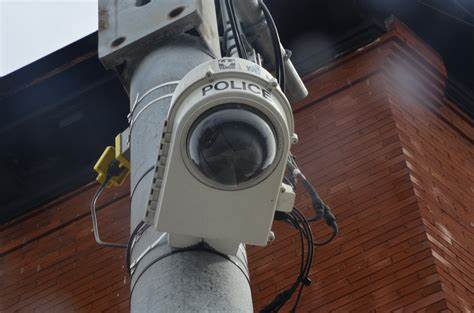On April 26th, Battered Women’s Support Services (BWSS) joined a coalition of 14 organizations across Vancouver to oppose a proposed Vancouver City Council motion calling for the expansion of CCTV throughout the city.

Thankfully, as a result of important advocacy by many groups and communities, the motion did not pass at Vancouver City Council.
This Motion lacked any grounding in evidence-based practices regarding the use of surveillance as a deterrent to crime or investigatory tool for policing. Furthermore, it involved no coherent anti-racist, anti-poverty, or human rights analysis of CCTV and its implications for marginalized community members. This motion was characterized by its complete failure to acknowledge the racist, classist, and potential rights violations that mass surveillance technologies rely upon.
Amnesty International has called for a ban on dangerous facial recognition technology, in recognition that this form of mass surveillance “amplifies racist policing and threatens the right to protest.” Amnesty specifically notes that Black people are most at risk of being misidentified by facial recognition systems.
While there are some survivors of gender based violence who may support the use of CCTV cameras, more surveillance will also explicitly target and harm Black, Indigenous and racialized women and people of marginalized genders living at the dangerous intersection of cisheteropatriarchy and racism.
Increasing CCTV is another expensive and dangerous tool to further criminalize women who are living in the DTES, especially racialized women and girls, drug users, and sex workers.
Research from Australia shows that the presence of CCTV makes women feel less safe in public spaces as it is viewed as an indicator that the space is unsafe. This results in women spending less time in public spaces. For sex workers of all genders, research has shown that they are less safe as surveillance increases. Surveillance of sex workers, whose labour is criminalized, leads to displacement and more isolated and remote working conditions. Sex workers are often a target for law enforcement, and surveillance, especially those who rely on public space, but their right to privacy is no less important than anyone else’s.
Further, CCTV cameras and increased surveillance do little to actually prevent gender-based violence, including fatal femicides, which have shockingly sky-rocketed during the pandemic.
A surveillance and crime-based funding and policy response to gender-based violence has consistently proven to be ineffective. Rather than expand CCTV, Council should prioritize systemic, community-based prevention and intervention strategies to end gender-based violence against women, girls, trans and gender-diverse people, especially those who are Black, Indigenous, newcomer immigrant/refugee, racialized, and low-income.
Effective gender-based intervention would tackle the core drivers of public safety. Specifically, this includes more accessible public spaces, affordable housing, front line mental health support, accessible and affordable transit, well lit streets, walkable neighborhoods, and community-based prevention strategies to end gender-based violence.
Read our letter to Vancouver City Council in full here and join us as we continue to advocate for meaningful safety solutions for all survivors.




